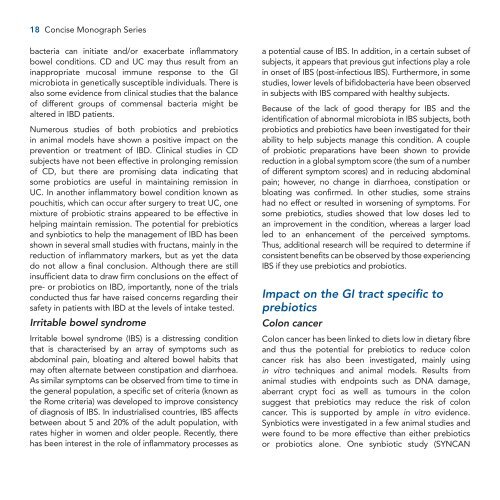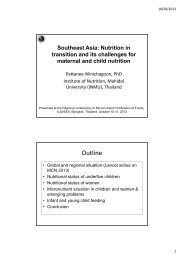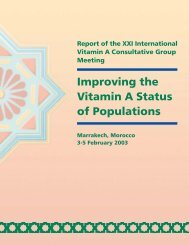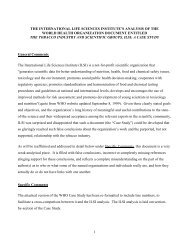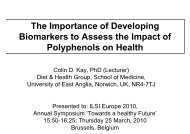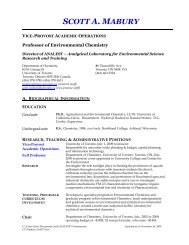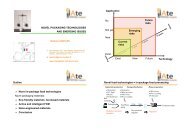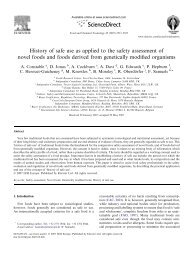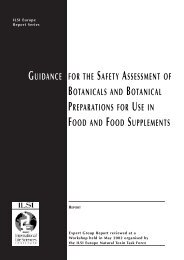probiotics, prebiotics and the gut microbiota - International Life ...
probiotics, prebiotics and the gut microbiota - International Life ...
probiotics, prebiotics and the gut microbiota - International Life ...
Create successful ePaper yourself
Turn your PDF publications into a flip-book with our unique Google optimized e-Paper software.
18 Concise Monograph Seriesbacteria can initiate <strong>and</strong>/or exacerbate inflammatorybowel conditions. CD <strong>and</strong> UC may thus result from aninappropriate mucosal immune response to <strong>the</strong> GI<strong>microbiota</strong> in genetically susceptible individuals. There isalso some evidence from clinical studies that <strong>the</strong> balanceof different groups of commensal bacteria might bealtered in IBD patients.Numerous studies of both <strong>probiotics</strong> <strong>and</strong> <strong>prebiotics</strong>in animal models have shown a positive impact on <strong>the</strong>prevention or treatment of IBD. Clinical studies in CDsubjects have not been effective in prolonging remissionof CD, but <strong>the</strong>re are promising data indicating thatsome <strong>probiotics</strong> are useful in maintaining remission inUC. In ano<strong>the</strong>r inflammatory bowel condition known aspouchitis, which can occur after surgery to treat UC, onemixture of probiotic strains appeared to be effective inhelping maintain remission. The potential for <strong>prebiotics</strong><strong>and</strong> synbiotics to help <strong>the</strong> management of IBD has beenshown in several small studies with fructans, mainly in <strong>the</strong>reduction of inflammatory markers, but as yet <strong>the</strong> datado not allow a final conclusion. Although <strong>the</strong>re are stillinsufficient data to draw firm conclusions on <strong>the</strong> effect ofpre- or <strong>probiotics</strong> on IBD, importantly, none of <strong>the</strong> trialsconducted thus far have raised concerns regarding <strong>the</strong>irsafety in patients with IBD at <strong>the</strong> levels of intake tested.Irritable bowel syndromeIrritable bowel syndrome (IBS) is a distressing conditionthat is characterised by an array of symptoms such asabdominal pain, bloating <strong>and</strong> altered bowel habits thatmay often alternate between constipation <strong>and</strong> diarrhoea.As similar symptoms can be observed from time to time in<strong>the</strong> general population, a specific set of criteria (known as<strong>the</strong> Rome criteria) was developed to improve consistencyof diagnosis of IBS. In industrialised countries, IBS affectsbetween about 5 <strong>and</strong> 20% of <strong>the</strong> adult population, withrates higher in women <strong>and</strong> older people. Recently, <strong>the</strong>rehas been interest in <strong>the</strong> role of inflammatory processes asa potential cause of IBS. In addition, in a certain subset ofsubjects, it appears that previous <strong>gut</strong> infections play a rolein onset of IBS (post-infectious IBS). Fur<strong>the</strong>rmore, in somestudies, lower levels of bifidobacteria have been observedin subjects with IBS compared with healthy subjects.Because of <strong>the</strong> lack of good <strong>the</strong>rapy for IBS <strong>and</strong> <strong>the</strong>identification of abnormal <strong>microbiota</strong> in IBS subjects, both<strong>probiotics</strong> <strong>and</strong> <strong>prebiotics</strong> have been investigated for <strong>the</strong>irability to help subjects manage this condition. A coupleof probiotic preparations have been shown to providereduction in a global symptom score (<strong>the</strong> sum of a numberof different symptom scores) <strong>and</strong> in reducing abdominalpain; however, no change in diarrhoea, constipation orbloating was confirmed. In o<strong>the</strong>r studies, some strainshad no effect or resulted in worsening of symptoms. Forsome <strong>prebiotics</strong>, studies showed that low doses led toan improvement in <strong>the</strong> condition, whereas a larger loadled to an enhancement of <strong>the</strong> perceived symptoms.Thus, additional research will be required to determine ifconsistent benefits can be observed by those experiencingIBS if <strong>the</strong>y use <strong>prebiotics</strong> <strong>and</strong> <strong>probiotics</strong>.Impact on <strong>the</strong> GI tract specific to<strong>prebiotics</strong>Colon cancerColon cancer has been linked to diets low in dietary fibre<strong>and</strong> thus <strong>the</strong> potential for <strong>prebiotics</strong> to reduce coloncancer risk has also been investigated, mainly usingin vitro techniques <strong>and</strong> animal models. Results fromanimal studies with endpoints such as DNA damage,aberrant crypt foci as well as tumours in <strong>the</strong> colonsuggest that <strong>prebiotics</strong> may reduce <strong>the</strong> risk of coloncancer. This is supported by ample in vitro evidence.Synbiotics were investigated in a few animal studies <strong>and</strong>were found to be more effective than ei<strong>the</strong>r <strong>prebiotics</strong>or <strong>probiotics</strong> alone. One synbiotic study (SYNCAN


